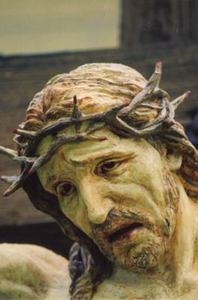Quaerens me, sedisti lassus
Third Sunday of Lent
John 4:5–52

A Monk’s Prayer
Saint John makes a point of saying that, “Jesus, wearied as He was with His journey, sat down beside the well. It was about the sixth hour” (Jn 4:6). A monk of the twelfth century, took this one sentence of the Gospel, listened to it over and over again, and repeated it to himself. The word of the Gospel passed from his mouth to his ears; from his ears into his mind; and from his mind into his heart. There, by the light of the Holy Spirit, he was opened to its deeper meaning and, in his heart, the word became prayer, a prayer that found expression in his poetry:
Quaerens me, sedisti lassus:
Redemisti Crucem passus:
Tantus labor non sit cassus.
Faint and weary, Thou hast sought me,
Crucified hast dearly bought me;
Shall such grace be vainly brought me?
Translated literally, the connection with today’s Gospel emerges more clearly:
Seeking me, all weary, Thou didst sit:
By Thy suffering on the Cross didst Thou redeem me;
Let not so great a labor come to nothing.
The Weary Christ
“Jesus, wearied as He was with His journey. . . .” (Jn 4:6). The image is profoundly moving: the weariness of a wayfaring Jesus. Not for nothing is this particular image given us today on the Third Sunday of Lent. We are at the midpoint of our own Lenten journey and susceptible, all of us, to a certain weariness. This particular Gospel of the weary, wayfaring Christ is given us today to remind us that the journey of God towards us precedes even our first step towards Him. We are sought by God before we begin to seek Him.
The Journey Driven By Love
Jesus comes to us as one weary of journeying. His journey is driven by love. His journey is towards us. Every step of His signifies the advance of love. The sound of His steps is that of “the Lord God walking in the garden” (Gen 3:8); His voice is that of the Lord God who called to the man and said to him, ‘Adam, where are you?’” (Gen 3:9). The journey is that of the shepherd who, “having a hundred sheep, if he has lost one of them, leaves the ninety-nine in the wilderness, and goes after the one which is lost until he finds it” (Lk 15:3).
The Sixth Hour
Saint John adds a significant detail to his description of the weary, wayfaring Jesus, seated by the well. He says, “It was about the sixth hour” (Jn 4:6). For us to hear the full resonance of this little phrase, we have to turn the pages of Saint John’s Gospel until we come to the crucifixion of Jesus in chapter 19. There we read, “Now it was the Day of the Passover; it was about the sixth hour.” The sixth hour sees Jesus “lifted up from the earth to draw all men to himself” (Jn 12:32). After a three hour agony, the crucified Jesus will reveal the thirst of man for God, and the thirst of God for man. “Jesus, knowing that all was now finished, said (to fulfil the scripture), ‘I thirst’” (Jn 19:28).

The Thirst of the Crucified
Our medieval poet associated the sixth hour weariness and thirst of Jesus seated at the well with the sixth hour suffering and thirst of Jesus on the Cross. “Quaerens me, sedisti lassus: / Redemisti Crucem passus.” “Faint and weary, thou hast sought me, / Crucified hast dearly bought me.” He had read his Gospel well.
The Well At Midday
Long before the author of the Dies Irae, Saint Augustine was captivated by Saint John’s description of the weary, wayfaring Christ. Preaching on this very Gospel passage, Augustine says, “Jesus is tired, tired out by His journey. He sits down. On the edge of a well He seats himself. It is midday, and He sits there exhausted. All these details have meaning. They are meant to signify something. They capture our attention, persuading us to knock and investigate further. We have Christ’s own exhortation to do so, for He said, ‘Knock, and it will be opened to you.’ May He, then, open up the meaning of this text to us as well as to you” (Homilies on the Gospel of John 15, 6-7).
The Divine Weakness
Divine power is revealed in the weakness, weariness and thirst of Jesus. Paul preaches that “the weakness of God is stronger than man” (1 Cor 1:25). Christ, seated at Jacob’s well, Christ, nailed to the Cross, is at once strong and weary. Christ is strong because He is God. We will acclaim Him at the adoration of the Cross on Good Friday as the “Sanctus fortis,” the “Holy Strong One.” He is strong because He is Love, and Love, we read in the Song of Songs, “is stronger than death . . . . Its flashes are flashes of fire, a most vehement flame” (Ct 8:6). At the same time, Christ is weak, “despised and rejected by men, a man of sorrows and acquainted with grief” (Is 53:3). By His power, He created us; in His weakness, He came in search of us, becoming weary as He journeyed.
The Journey from the Womb to the Tomb
What is the journey that so wearied the Son of God? Saint Augustine says that the journey is that of the incarnation: the long descent of the Word from the bosom of the Father to the virginal womb of Mary; and all the roads He traveled “in the form of servant” (Phil 2:7) until, at length, having rested for a moment at Jacob’s well, He came to the Cross.
His Presence Gives Us Strength
“Wearied by His journey, Jesus sat down beside a well. It was about the sixth hour” (Jn 4:6). Augustine contemplates the weary, wayfaring Christ, and lets his heart speak: “Not for nothing is Jesus wearied; not for nothing does the power of God suffer fatigue. Not for nothing does He who refreshes the weary endure weariness. Not for nothing is He wearied, whose absence makes us weary, and whose presence gives us strength” (Homilies on the Gospel of John 15, 6-7).
The Labour of Love
The last line of the strophe from the Dies Irae is a plea: “Tantus labor non sit cassus.” “Let not so great a labour be in vain.” It is Christ’s labour for us: the labour of His journey into the depths of human weakness, the labour of His love, the labour of His obedience, the labour of His Passion and Cross. Let nothing of so great a labour be lost!
Let Nothing of It Be Lost
Ultimately, today’s Gospel takes us from the contemplation of the weary, wayfaring Christ to the revelation of the thirst of God. This is the astonishing revelation made by Christ to the Samaritan woman at the well: not our thirst for God, but the thirst of God for us. It was, in some way, the thirst of God that compelled Christ to invent the Eucharist. What is the mystery of the Eucharist, after all, if not the thirst of God made food and drink to quench our thirst for Him? In the mystery of the Most Holy Eucharist, the weariness of a wayfaring God and the weariness of every wayfaring human heart come to rest. The Eucharist is Love’s great labour. Let nothing of it be lost.
